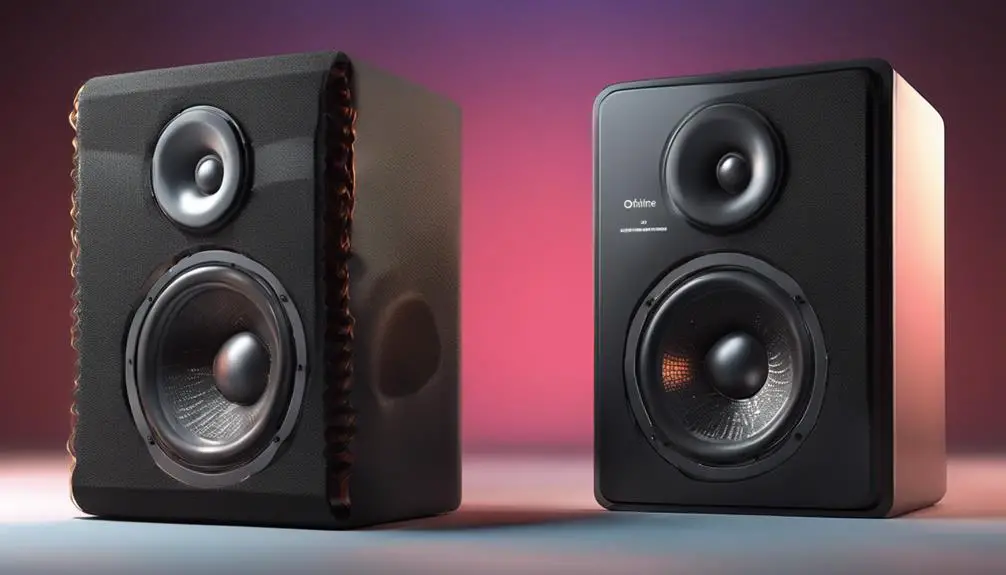When you're deciding between 4 ohm and 8 ohm speakers, it's not just about numbers; it's about how they fit into your audio setup. You might find that 4 ohm speakers can deliver more power, making them suitable for those who crave deep bass in larger spaces. On the other hand, 8 ohm speakers often provide clearer sound and wider compatibility with various amplifiers. However, the right choice hinges on your specific needs and equipment compatibility. So, what's the best option for your setup? Let's explore the nuances together.
Understanding Speaker Impedance
When choosing speakers, understanding impedance is key to ensuring they work well with your audio system. Impedance, measured in ohms, affects how much electrical resistance the speakers present to the amplifier. Most commonly, you'll encounter 4 ohm and 8 ohm speakers, and knowing the difference can help you avoid potential issues.
If you connect speakers with too low an impedance to an amplifier not designed for it, you risk overheating and damaging your equipment. For instance, an 8 ohm speaker draws less current than a 4 ohm speaker. If your amplifier is rated for 8 ohm speakers and you connect 4 ohm ones, it might struggle to handle the increased load, leading to distortion or even failure.
Conversely, if you're using an amplifier that supports both, you can safely mix and match speaker impedances. Always check your amplifier's specifications before making a purchase, as compatibility is essential for peak performance. Remember, using the right impedance can not only enhance sound quality but also prolong the lifespan of your audio equipment, keeping your system safe and enjoyable for years to come.
Advantages of 4 Ohm Speakers
4 ohm speakers offer several advantages, particularly regarding power handling and efficiency, making them a popular choice for many audio enthusiasts. One key benefit is their ability to draw more power from your amplifier. This means you'll typically get higher sound output without needing to crank up the volume too much, which can help prevent distortion and potential damage to your equipment.
Since 4 ohm speakers require less voltage to produce the same wattage as higher impedance speakers, they can be ideal for setups where you want to maximize performance without overloading your amplifier. This efficiency can lead to a more dynamic sound experience, especially in bass-heavy genres.
Moreover, using 4 ohm speakers can allow you to pair them with amplifiers designed for lower impedance loads, ensuring that you're safe from overheating and other risks associated with mismatched equipment. Just remember, if you're connecting multiple speakers, you'll need to handle your wiring carefully to avoid overloading your system. Overall, 4 ohm speakers provide an excellent balance of power and quality, making them a smart choice for your audio setup.
Advantages of 8 Ohm Speakers
While 4 ohm speakers have their benefits, 8 ohm speakers also offer distinct advantages that make them appealing for various audio setups. First and foremost, 8 ohm speakers are generally easier to drive. This means you won't need a high-powered amplifier to achieve good sound quality, which can help prevent overheating and potential damage to your equipment.
Moreover, 8 ohm speakers tend to be more compatible with a wider range of audio gear. Many amplifiers are designed to work efficiently with 8 ohm loads, making it simpler for you to find the right match without worrying about system overloads.
Additionally, using 8 ohm speakers can lead to better sound staging and clarity, especially in larger rooms. They often handle power more efficiently, allowing you to enjoy a cleaner audio experience without distortion.
Lastly, if you're considering a multi-speaker setup, 8 ohm speakers provide flexibility in wiring configurations. You can safely connect multiple speakers in parallel or series without risking damage. Overall, these advantages make 8 ohm speakers a reliable choice for both casual listeners and audiophiles alike.
Choosing the Right Speaker
Selecting the right speaker involves considering factors like impedance, power handling, and your specific listening environment. You'll want to match your speaker's impedance with your amplifier to guarantee safe and efficient operation. Here's a quick reference to help you decide:
| Impedance | Power Handling | Environment |
|---|---|---|
| 4 Ohm | Higher wattage | Larger spaces |
| 8 Ohm | Lower wattage | Smaller rooms |
| Mixed (4/8 Ohm) | Varies | Versatile setups |
When choosing between 4-ohm and 8-ohm speakers, think about your amplifier's capabilities and your listening area. If you're using a powerful amplifier and have a spacious room, 4-ohm speakers might be the way to go for maximum output. However, if you're in a smaller area and prefer a more controlled sound, 8-ohm speakers may suit your needs better.
Always prioritize safety by verifying your equipment can handle the selected impedance. This helps prevent overheating and potential damage. Ultimately, choose speakers that not only fit your space but also align with your listening preferences.

